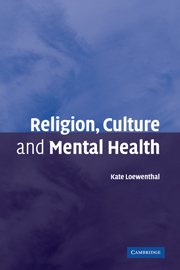9 - Conclusion
Published online by Cambridge University Press: 22 September 2009
Summary
Can religious factors cause or exacerbate mental disorders? Can they ameliorate them? And how might effects depend on culture?
We can obviously reach the general conclusion that religious factors can affect mental health, sometimes for the good, sometimes not, and some of these effects can vary with cultural context.
A number of common ideas and stereotypes about religion, culture and mental health have been examined. Not all of them seem to stand up in the light of current evidence, patchy and imperfect as this might be.
For instance, there is little evidence that religious factors can play a causal role in mental disorder. Some of the suggestions which have been made on this topic include:
Religion makes people feel guilty, provoking anxiety disorders – including and perhaps especially obsessive compulsive disorder.
Some religions encourage paranormal experiences, the seeing of visions, hearing voices and other experiences which are delusory, and this may cause psychiatric breakdown.
Religions may legitimate various forms of abuse, for the sake of enforcing religious rules, and this has psychiatric effects – depression, dissociation and post-traumatic stress disorder.
We have seen that there is little or no support for these suggestions: religion may influence the form of OCD, but there is no evidence to suggest that its likelihood is influenced. Visions and voices may be encouraged in some religious traditions, but they do not in themselves result in psychiatric breakdown – their unpleasantness and lack of controllability seems to be the crucial factor, and this is not related to religious factors.
- Type
- Chapter
- Information
- Religion, Culture and Mental Health , pp. 140 - 141Publisher: Cambridge University PressPrint publication year: 2006



